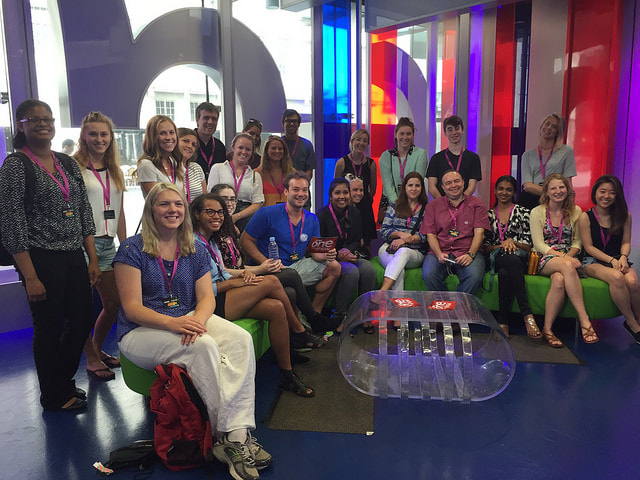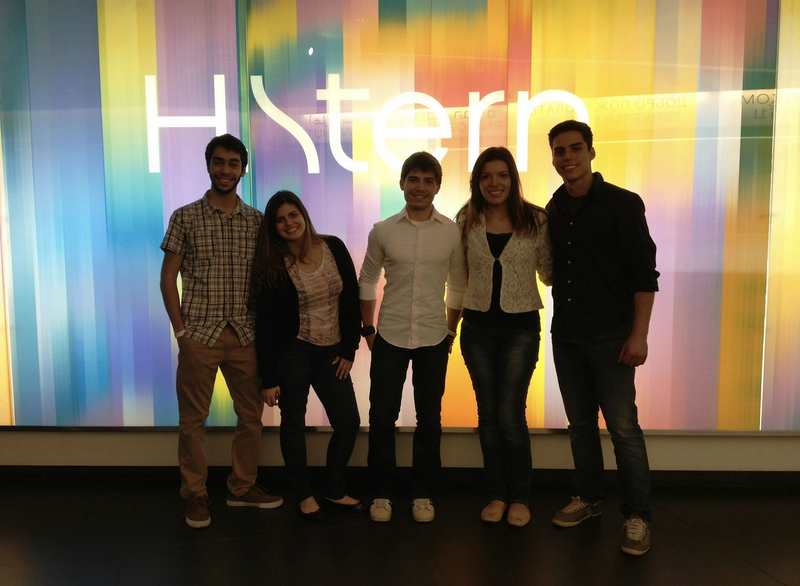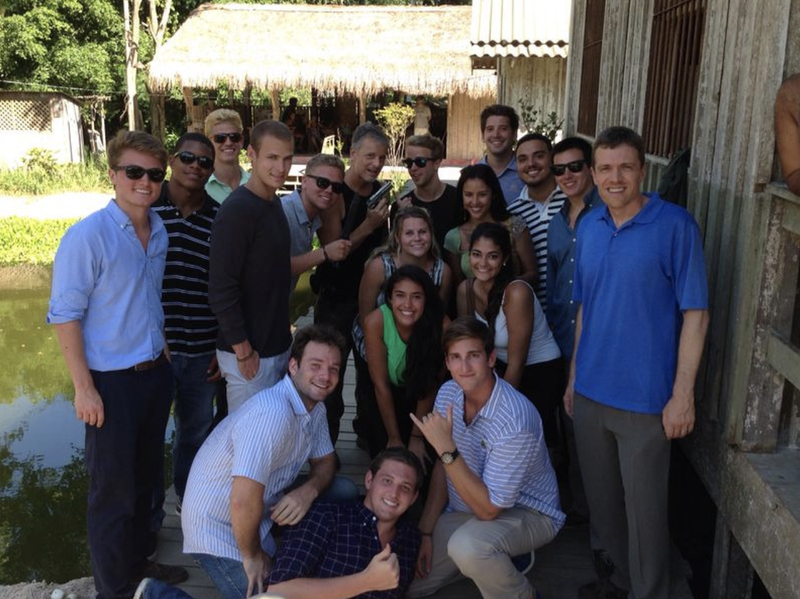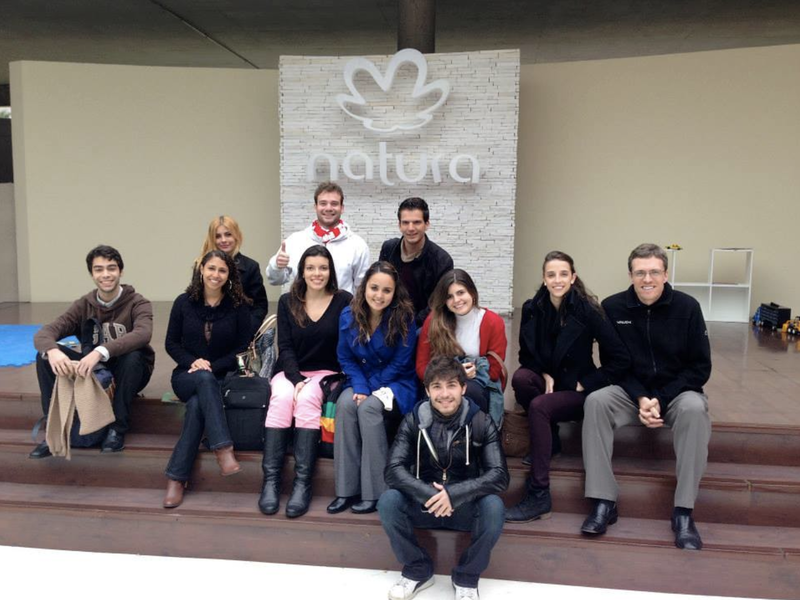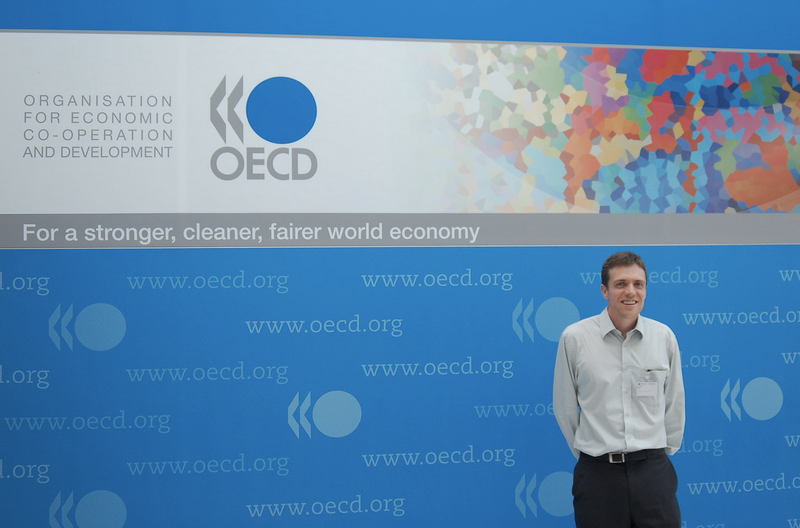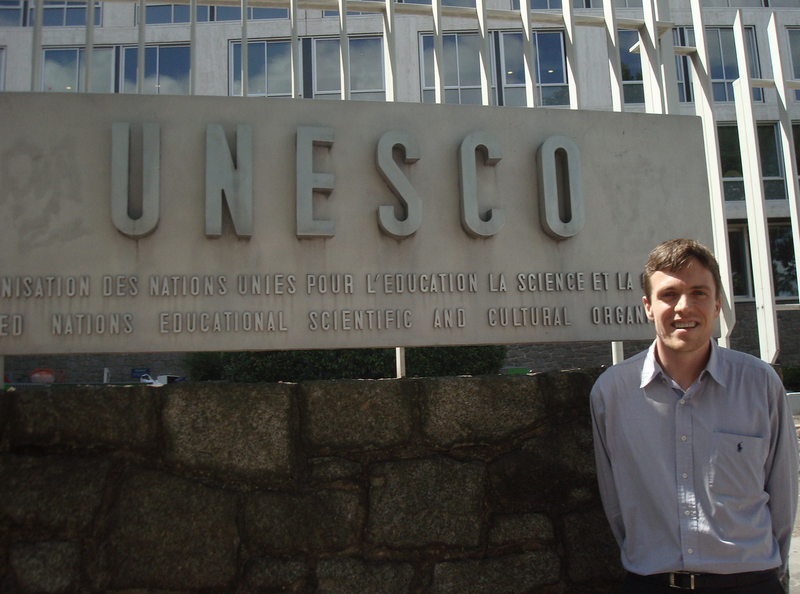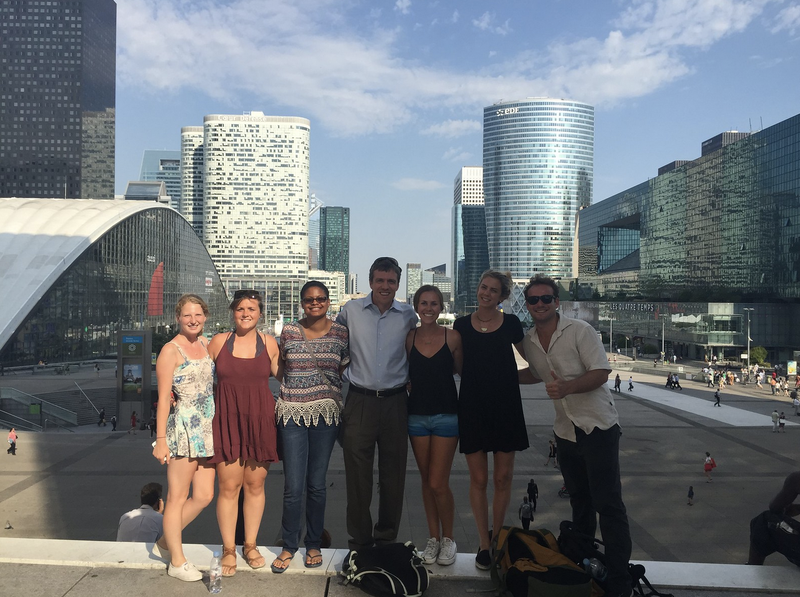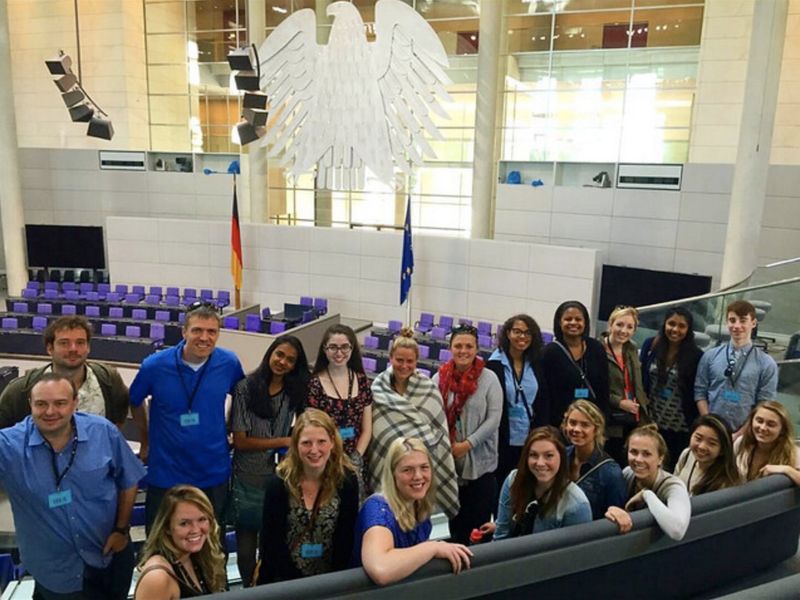Professional & Cultural Visits
In addition to traditional classroom learning, Summit Global Education offers unique opportunities for students to learn through professional and cultural visits to leading and innovative organizations. During our study abroad programs, students will have the chance to visit a variety of interesting companies and organizations and gain valuable insights into different professional and cultural environments. These visits are designed to enhance the overall educational experience and provide students with a more well-rounded understanding of the countries they are visiting.
|
Purpose of professional visits:
|
Professional and cultural visits can be an integral part of a study abroad experience, providing students with the opportunity to learn about local cultures, industries, and professional practices. These visits can be an important factor for students who are considering studying abroad because they provide an opportunity to:
At Summit Global Education, we are committed to providing our students with high-quality professional and cultural visits that are both educational and enjoyable. We believe that these experiences can be an integral part of a student's study abroad journey, and we strive to offer a range of diverse and exciting options that cater to a variety of interests and goals. Whether you are interested in learning about the local culture, making connections with professionals, or simply exploring new and exciting destinations, we are confident that our professional and cultural visits will provide something for everyone. |
View all videos from PROFESSIONAL VISITS on YouTube here:
|
Companies & Organizations:
At Summit Global Education, the educational experience is enhanced by the professional and cultural visits within the countries we visit. During our upcoming study abroad programs, students will have the unique opportunity to learn through professional & cultural visits to some amazing companies and organizations.
Below is a list of companies that students have visited in the past on Summit Global Education programs, along with new visits we are planning for upcoming Summit programs.
Below is a list of companies that students have visited in the past on Summit Global Education programs, along with new visits we are planning for upcoming Summit programs.
European visits:
In the past, we have organized a range of professional visits for our students in Europe. Below, you will find a list of some of these visits. Please note that these visits may vary depending on the location and program.
Past visits have included: Estrella Damm Factory This beer is the jewel in the crown of Damm’s century-long beer-brewing experience. Since 1876, when Alsatian August Kuentzmann Damm founded the company bearing his name, numerous generations of master brewers have perfected this lager until it has become a landmark in the world of beers. During this visit, students may see a film and have a guided tour of the highly automated brewing process, packaging and loading procedures which is followed by a tasting in the tavern. FC Barcelona Museum Trophies, documents, photographs and audiovisual shows trace the history of one of the greatest football clubs in the world. Students may view the stadium from the grandstand and follow in the footsteps of world-class stars as they explore the Camp Nou football stadium. Students may be escorted into the dressing rooms, down the famous tunnel, enjoy access to off-limits areas, and sit on benches warmed by some of the world's best players. Students may also see the “press box” and the Presidential Honor Box. Codorníu Cava Producers The Penedes Valley, just west of Barcelona, is famous for its Cava, or sparkling wine, produced using the Methode Champenoise. A visit to the Codorníu cellars gives the students an opportunity to immerse themselves in the history of cava. Its architecture, history, tradition, innovation, viticulture and winemaking are all brought to life, making Codorníu’s cellars a place full of magic. The worldwide marketing of Codorníu may be a focus of this visit which may conclude with a tasting. SEAT A guided tour of the enormous SEAT factory which employs over 10,000 staff may enable the students to gain an insight into the production of the cars and how different departments work with each other in this state of the art manufacturing facility. A company representative may answer students’ questions. OECD The mission of the OECD (Organization for Economic Cooperation and Development) is to promote policies that will improve the economic and social well-being of people around the world. The OECD provides a forum in which governments can work together to share experiences and seek solutions to common problems. Students may tour the OECD, learn about OECD projects around the world and attend a lecture by OECD representatives which may be followed by a question and answer period. UNESCO Students may visit UNESCO (United Nations Educational, Scientific and Cultural Organization) headquarters located at Place de Fontenoy in Paris, France. The headquarters is an outstanding, Modernist building inaugurated in 1958 and recently renovated. Students may watch a video on UNESCO’S work worldwide and tour the building. At the end of the visit students are given the chance to discuss issues raised during the visit with a UNESCO representative. German Parliament (Reichstag Building) Constructed to house the Imperial Diet (German: Reichstag), of the German Empire, it was opened in 1894 and housed the Diet until 1933, when it was severely damaged in a fire. After World War II, the building was not used and fell into disrepair. The ruined building was partially refurbished in the 1960s, but no attempt at full restoration was made until after German reunification in 1990. After its completion in 1999, it once again became the meeting place of the German Parliament: the modern Bundestag. There may be a guided tour of the German Parliament. The roof terrace and dome of the Reichstag Building offer an incomparable view of Berlin's parliamentary and government quarter. BMW Motorcycle Factory The BMW Berlin Plant has a long tradition as production site, as we as an exciting history. This site is the birth place of BMW motorcycles. Students may see first-hand the highly modern vehicle production, where man and machine build BMW motorcycles. In this exclusive tour, knowledgeable guides may provide explanations about BMW motorcycles, their heritage and production and may also answer questions. More companies to be added soon... |
Brazilian visits:
Over the years, we have arranged various professional visits for our students in Brazil, which have included the following (note that the specific visits may vary by location and program). Take a look at some of our past professional visits below:
Past visits have included: PROJAC - Rede Globo Globo is the most important television and media conglomerate in South America. It is the worlds second largest television network, second only behind ABC in the USA. The network's main production studios are located at a complex dubbed Projac (short for "Jacarepaguá project"), located in Jacarepaguá, Barra da Tijuca. The enormous complex has huge studios, where the massively-popular tele-novelas are written, directed and produced (including large full-scale city productions for producing movies and television shows). Projac is the largest production center of the world, with an area of 1 million and 600 thousand m2, housing studios, fictional cities, islands of editing, post production, special effects, factory settings, costumes, technical support to production, administration and services. Currently, Projac holds twelve recording studios, three snack bars, a restaurant, bank, and they are currently building more: new studios, centers support to fictional cities, a the theater and an administrative building. Students visit the facilities, and gain understanding of the role that "Globo" has played in the history of the Brazilian Republic, with an influence on politics, fashion, business, culture and more. BNDES - one of the largest development banks in the world. BNDES (Banco Nacional de Desenvolvimento Econômico e Social) goal is to provide long-term financing for endeavors that contribute to the country's development. With a headquarters in Rio (very near to ESPM), students will have the unique opportunity to visit this very important Brazilian institution. In recent years, Barack Obama has indicated that BNDES could serve as a role-model for the manner in which government's partner with industry, and stimulate the economy. An interesting case-study is to see how BNDES played a pivotal role in the development of EMBRAER, the Brazilian aircraft manufacturer. Learn more about BNDES online here. Cidade do Samba (Samba City) More than just a massive carnaval warehouse, the Samba City is an advanced "samba school factory"; a precise project management business with cutting edge CAD/CAM technology. A massive area, the Samba City occupies an area of 92,000m², located near the port. Samba production is a multi-million dollar industry in Rio de Janeiro, and the Samba City is at the heart of the planning process. Students will learn about the management of this entertainment industry which is vital to projecting Rio's image around the world. Supervia "Transportation changes lives". This theme will be examined by students as we consider how Rio de Janeiro is looking to prepare for the upcoming Olympics and World Cup - two major events that will significantly transform the city. Not only is Rio de Janeiro planning new mass-transit systems, but they are also attempting to integrate the "communities" (favelas, slums) into the city network. In this effort, SuperVia began operating the "Complexo do Alemão" cable car, the first mass transit aerial lift passenger system in Brazil. The cable car is integrated into the urban rail transport system and has six stations - "Bonsucesso", "Adeus", "Baiana", "Alemão", "Itararé/Alvorada" and "Palmeiras". The system consists of 152 gondolas, each of which can carry 10 passengers, eight seated and two standing, and is 3.5 km in length. During our program, students will visit with Supervia's control operation and meet with company management to learn how Rio is using new transportation systems to radically transform people's lives in these communities. Associação Comercial e Empresarial Novo Alemão e Penha Professors from ESPM are working with the Commercial Association of the "Complexo Alemao" favela (slum) in Rio de Janeiro. Home to around 400,000 inhabitants, this area was, until recently, under the domain of criminals and drug gangs. But, starting in 2010, Rio de Janeiro has made a major push into the "pacification" or "normalization" of these communities. With a large security force, and a following investment in infrastructure, the city of Rio de Janeiro has put a huge effort into integrating these communities into the network of regularized communities. But, beyond just offering security and infrastructure, the government is looking for sustainable development strategies to lift the people out of poverty. ESPM professors have been working on a marketing and communications plan, in cooperation with the Commercial Association of Complexo Alemao. The idea is to develop a sustainable business development model to improve business in the local community, which can be rolled out to the other "normalized" communities across Rio de Janeiro. Students will have the opportunity to learn about this project. Beleza Natural - "high-impact entrepreneurship" “I saw an opportunity to make all Brazilian women feel beautiful, despite their financial means.” Leila Velez, ESPM graduate. Leila Velez is founder and CEO of the chain of Beauty Institutes, Beleza Natural, one of the companies selected by Você SA magazine in its “Empreendedores do novo Brasil” ranking as successful achiever. The Institute Endeavor has supported her entrepreneurial initiatives since 2005. This operation, which began in 1993, was entirely self-financed, largely due to her husband, Jair, selling his VW Beatle, has earned her the Ernst and Young’s Entrepreneur of the Year award in 2006 and recognition as one of Brazil’s Most Influential Women in 2007. See the writeup from Forbes.com here. Her company donates generously and offers free hair care to women in poor communities. In fact, 70% of her workforce are former clients, and women from these underserved communities. Beleza Natural has had a growth rate of more than 300% in the last 5 years, serving 70,000 low income women per month and employing 1,300 people. They are now undergoing a very thorough preparation to get the company ready for national and thereafter international expansion. Mercadão de Madureira - the largest popular market in Brazil An interesting and lively market in the outskirts of Rio, Madureira is the largest popular market anywhere in Brazil. Going to this market anytime would be interesting, but going along with an anthropology professor from ESPM to discuss the culture and local business environment is a unique opportunity to gain insight into the world of Brazilian culture and commerce. Rio Ponto Cine - using culture to spur development Using art to change society. This project in Guadalupe, one of the poorer neighborhoods in Rio de Janeiro is extremely interesting. Learn more about the project online here: http://www.pontocine.com.br/ Guest Lecture: “The rise of Brazil”, by Luiz Felipe Lampreia Luiz Felipe Lampreia was Brazil's minister of foreign affairs from 1995 to 2001. He has played a leading role in Brazilian foreign and economic policy for almost forty years, including serving as undersecretary for political affairs and secretary general of the Foreign Ministry, and representing the nation as a diplomat in Portugal and Suriname, at the United Nations in New York and Geneva, and at the Uruguay Round of trade negotiations. Mr. Lampreia studied sociology at the Catholic University in Rio de Janeiro and graduated from the Brazilian Diplomatic Academy. See his personal blog for ESPM students online here. Rio Negocios - Investment promotion Rio Negocios (http://rio-negocios.com/en/) is the international promotion agency for the city of Rio de Janeiro. Discussion with ESPM graduates about how "Rio Negocios" played a role in attracting Microsoft to select Rio de Janeiro as their location in Brazil, and about the future of Rio. A possible professional visit with students may include discussions with Rio Negocios about the steps Rio de Janeiro is taking to attract investment to the city in preparation for the upcoming World Cup and Olympics. Porto Maravilha (Wonderful Port) - Major Urban Regeneration Plan The Porto Maravilha (Wonderful Port) in the heart of the city center, reclassifies five million square meters and will be instrumental in the design of the 2016 Olympics. The revival of the Docklands is one of the main interventions planned by the City Hall for years to come. The process is a result of joint efforts of Federal, State and Municipal, in two phases, the first publicly-funded and private resources with the second coming from an Urban Operation with investments of up to $ 3 billion. This initiative will include innovative projects of urban infrastructure, large housing stock, development of a new cultural center and entertainment, and the development of new business that will attract companies, generate 40,000 new jobs and $ 200 million in additional taxes. A possible professional visit with students may include discussions with the port redevelopment team outlining future plans, project management, and discussion about how this will transform the downtown area of Rio de Janeiro. Read more about this project here. More companies to be added soon... |
*Note: the above list is given here to indicate the TYPE of visits students might engage in. None of these visits are guaranteed for the upcoming program, and many other visits may take their place. The list shown above is indicated here just to give potential students an idea about the type of visits we are planning for our students, and the level of academic involvement. Additional Cultural activities & Tours can be found our "Detailed Itinerary" pages for the upcoming program.

